人教版 高考英语语法专项课件 名词性从句 课件(87页PPT)
文档属性
| 名称 | 人教版 高考英语语法专项课件 名词性从句 课件(87页PPT) |  | |
| 格式 | zip | ||
| 文件大小 | 2.5MB | ||
| 资源类型 | 试卷 | ||
| 版本资源 | 人教版(2019) | ||
| 科目 | 英语 | ||
| 更新时间 | 2023-02-17 15:13:00 | ||
图片预览

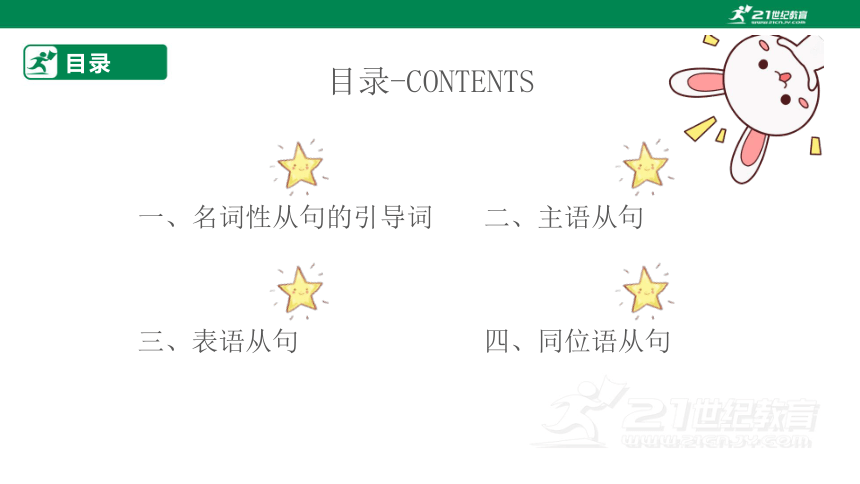
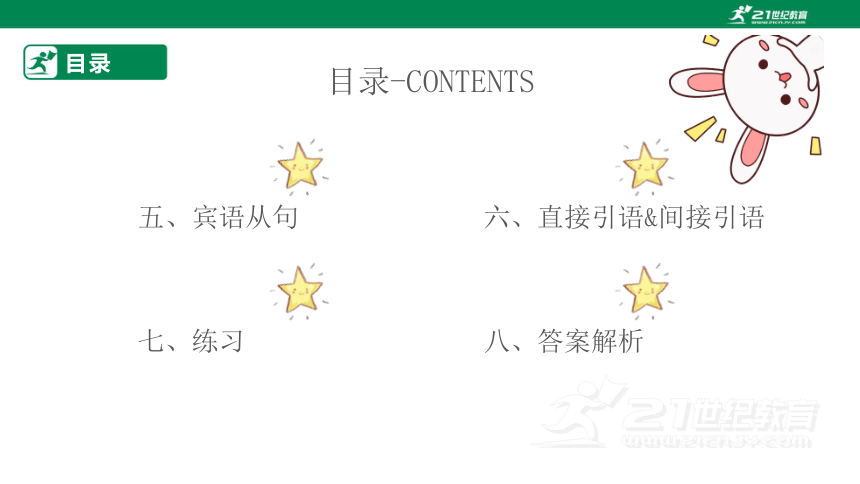
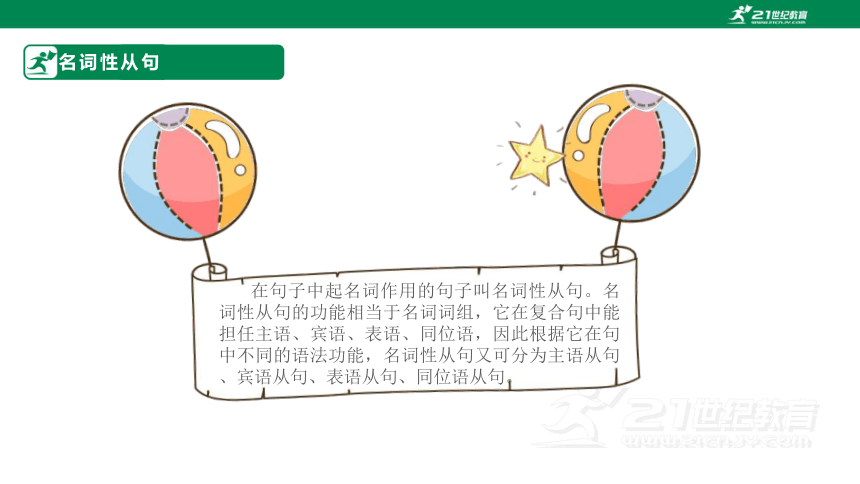
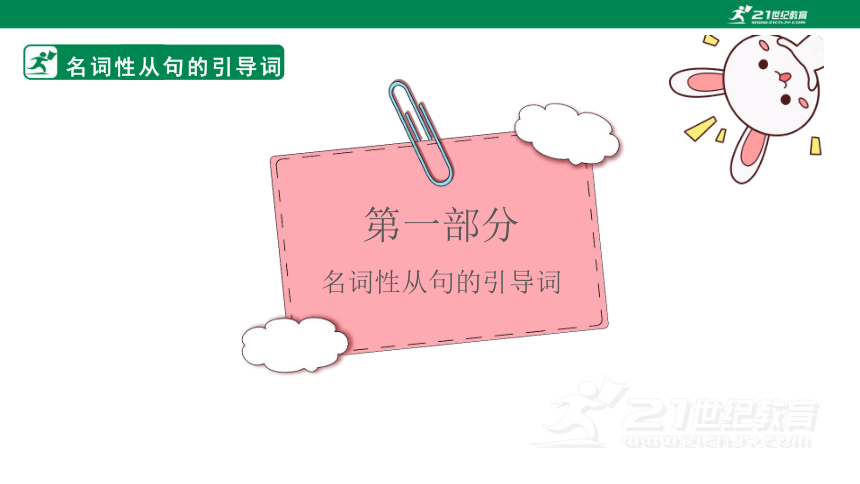
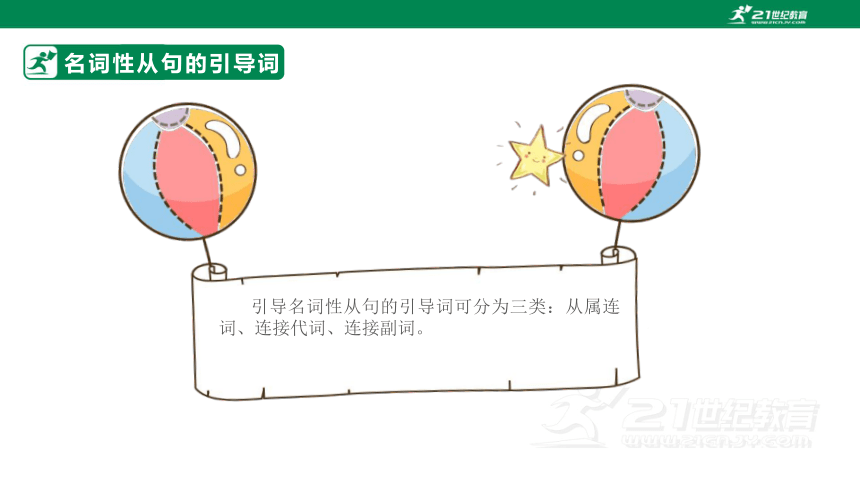
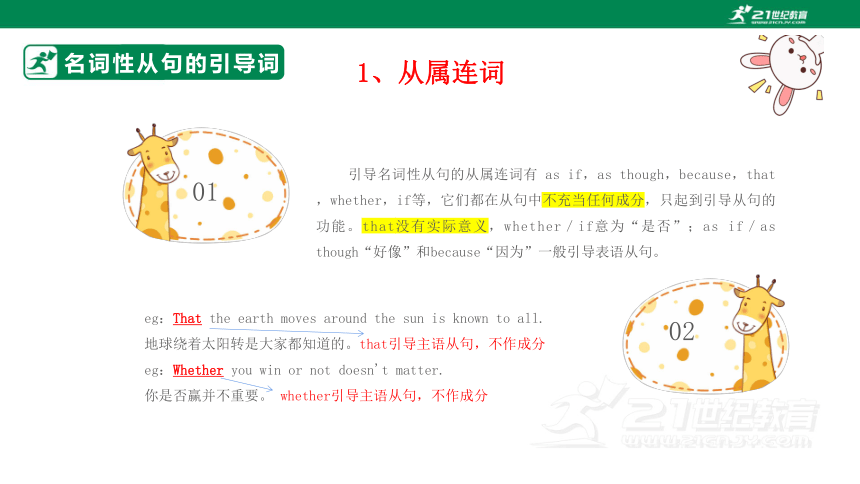
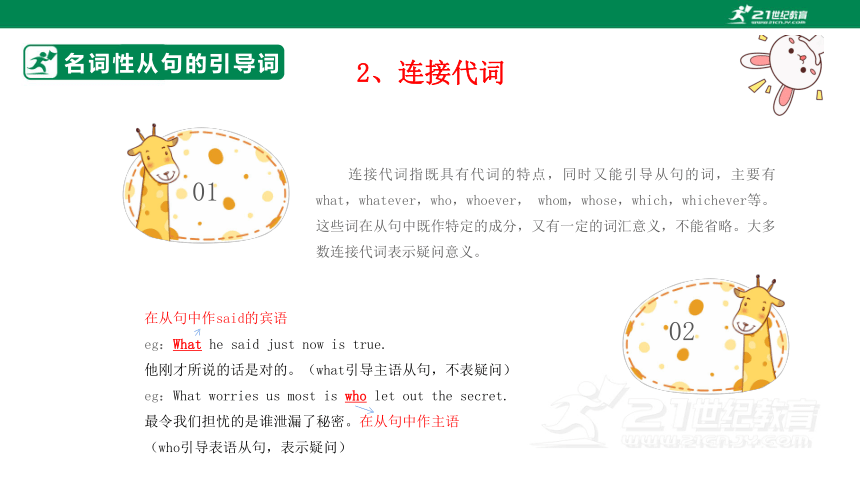
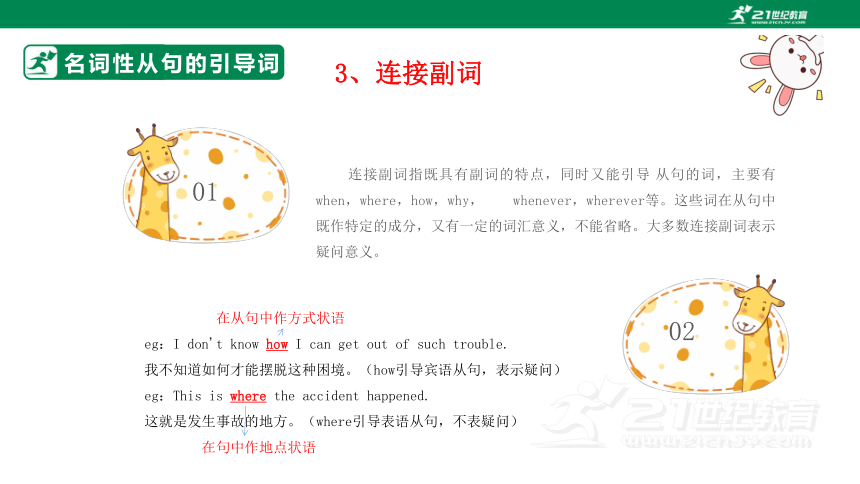
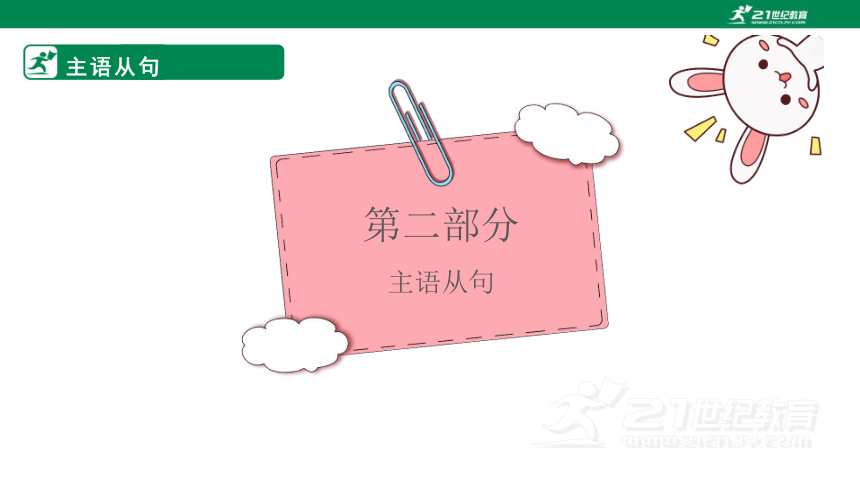
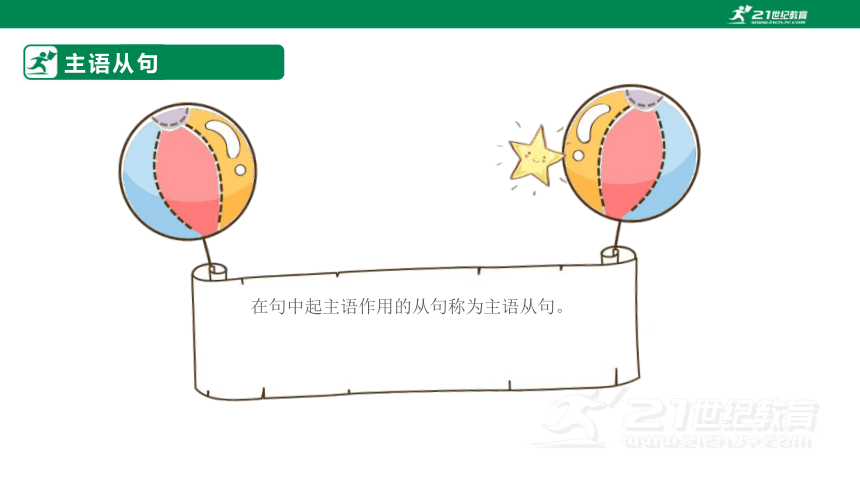
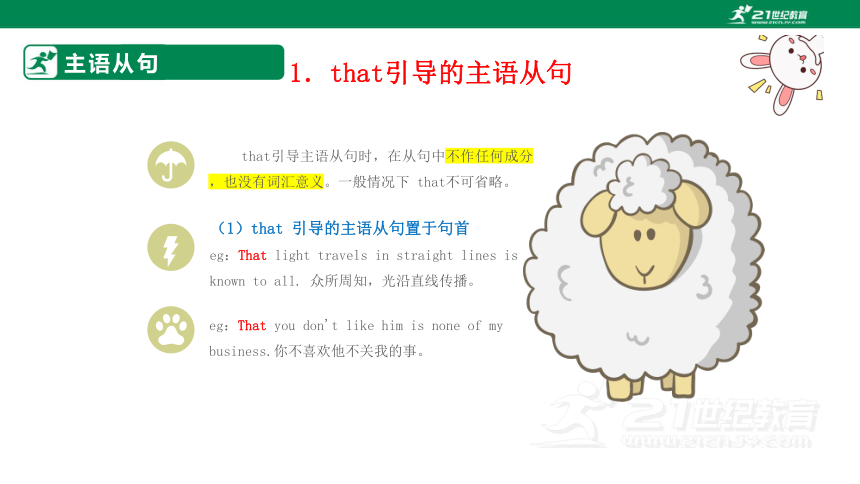
文档简介
(共87张PPT)
名词性从句
【备考2023】高考专项语法
目录
目录-CONTENTS
一、名词性从句的引导词
二、主语从句
三、表语从句
四、同位语从句
目录
目录-CONTENTS
五、宾语从句
六、直接引语&间接引语
七、练习
八、答案解析
名词性从句
在句子中起名词作用的句子叫名词性从句。名词性从句的功能相当于名词词组,它在复合句中能担任主语、宾语、表语、同位语,因此根据它在句中不同的语法功能,名词性从句又可分为主语从句、宾语从句、表语从句、同位语从句。
名词性从句的引导词
第一部分
名词性从句的引导词
名词性从句的引导词
引导名词性从句的引导词可分为三类:从属连词、连接代词、连接副词。
名词性从句的引导词
1、从属连词
01
引导名词性从句的从属连词有 as if,as though,because,that,whether,if等,它们都在从句中不充当任何成分,只起到引导从句的功能。that没有实际意义,whether/if意为“是否”;as if/as though“好像”和because“因为”一般引导表语从句。
eg:That the earth moves around the sun is known to all.
地球绕着太阳转是大家都知道的。that引导主语从句,不作成分
eg:Whether you win or not doesn't matter.
你是否赢并不重要。 whether引导主语从句,不作成分
02
名词性从句的引导词
2、连接代词
01
连接代词指既具有代词的特点,同时又能引导从句的词,主要有what,whatever,who,whoever, whom,whose,which,whichever等。这些词在从句中既作特定的成分,又有一定的词汇意义,不能省略。大多数连接代词表示疑问意义。
在从句中作said的宾语
eg:What he said just now is true.
他刚才所说的话是对的。(what引导主语从句,不表疑问)
eg:What worries us most is who let out the secret.
最令我们担忧的是谁泄漏了秘密。在从句中作主语
(who引导表语从句,表示疑问)
02
名词性从句的引导词
3、连接副词
01
连接副词指既具有副词的特点,同时又能引导 从句的词,主要有when,where,how,why, whenever,wherever等。这些词在从句中既作特定的成分,又有一定的词汇意义,不能省略。大多数连接副词表示疑问意义。
在从句中作方式状语
eg:I don't know how I can get out of such trouble.
我不知道如何才能摆脱这种困境。(how引导宾语从句,表示疑问)
eg:This is where the accident happened.
这就是发生事故的地方。(where引导表语从句,不表疑问)
在句中作地点状语
02
主语从句
第二部分
主语从句
主语从句
在句中起主语作用的从句称为主语从句。
主语从句
1.that引导的主语从句
that引导主语从句时,在从句中不作任何成分,也没有词汇意义。一般情况下 that不可省略。
eg:That light travels in straight lines is known to all. 众所周知,光沿直线传播。
(1)that 引导的主语从句置于句首
eg:That you don't like him is none of my business.你不喜欢他不关我的事。
主语从句
1.that引导的主语从句
that从句作主语通常用it作形式主语,而将that从句置于句末。常见的it替代主语从句的句式主要有以下几种:
eg:It is obvious that you've made a big mistake.很明显你犯了一个大错。
①It+系动词+形容词+that从句。
eg:It is likely that he can't come to the meeting.很可能他不来参加会议了。
(2)形式主语it替代主语从句
主语从句
1.that引导的主语从句
在“It is necessary/important/surprising/strange/ unthinkable/unbelievable/incredible+that从句”结构中,从句常用“(should+)动词原形”形式,其中should 可省略。
eg:It is necessary that a college student(should) master one or two foreign languages.大学生掌握一两门外语是必要的。
eg:It is strange that you (should) trust Jane.很奇怪你竟然相信简。
【拓展】
主语从句
1.that引导的主语从句
eg:It is common knowledge that the whale is not a fish.鲸鱼不是鱼,这是常识。
eg:It's no wonder that you've failed again.
难怪你又失败了。
eg:It is reported that no passengers were injured in the accident.
据报道在事故中没有乘客受伤。
eg:It is announced that the plan has been successfully carried out.据宣布计划已顺利实施
② It+系动词+名词+that从句。
③ It+be+动词的-ed形式+that从句。
主语从句
1.that引导的主语从句
常用于这种结构的动词有:
appear 显得;matter 重要;happen 碰巧
occur 出现;turn out结果是
eg:It happened to me that I was away when he called.他打电话时,我正好不在家。
eg:It turns out that our team has won the game.结果是我们队赢了这场比赛。
④It+动词(+宾语或状语)+that从句
主语从句
2.whether 引导的主语从句
whether在从句中不作任何成分,只起连接作用,不能省略,表示“是否”,有时也可用it作形式主语代替。
eg:Whether you can succeed or not depends on how hard you work at it.
你能否成功取决于你努力的程度。
eg:Whether the work can be completed on time is doubtful.这项工作能否按时完成还没准呢。(可改为It is doubtful whether the work can be completed on time.)
主语从句
3.wh-类连接词引导的主语从句
wh-类连接词包括wh-类的连接代词(who,whom,whose,what, whoever,whomever,whosever, whatever等)和连接副词(when,where,how, why,whenever,wherever,however等)。
eg:Whoever breaks the law will be punished.
王子犯法与庶民同罪。连接代词充当主语
eg:Why they suddenly disappeared still remains a mystery. 连接副词充当原因状语
它们(恐龙)为什么突然消失了还是个谜。
表语从句
第三部分
表语从句
表语从句
在句中作表语的从句称为表语从句。可以引导表语从句的连接词主要有that,whether,wh-类连接词,as if, as though,because等。
表语从句
1.that引导的表语从句
that 无词义,一般不省略
eg:The fact is that we should depend on ourselves. 事实就是我们必须依靠自己。
eg:The reason for his absence is that he hasn't been informed. 他缺席的原因是他没接到通知。
表语从句
2.whether引导的表语从句
whether 仍保留“是否”的意义,不能换成if
eg:What I was uncertain about was whether they could do the work well. 我不能确定的是他们是否能把工作做好。
eg:The question is whether my parents agree with me. 问题是我父母是否同意我的看法。
表语从句
3.wh-类连接词引导的表语从句
wh-类连接词包括连接代词(who,whom,whose,what,which,whoever,whatever,whichever等) 和连接副词(where,when,how,why,wherever, whenever等)。此类词大多数表示疑问,偶尔表示陈述。
eg:This is what I am interested in.
这就是我所感兴趣的。
表语从句
4.as if, as though 引导的表语从句
此类表语从句常跟在特定动词后面,如seem,appear,look,taste,sound,feel等,可用陈述语气,也可用虚拟语气。
eg:It sounds as if someone is knocking at the door.听上去好像有人在敲门。陈述语气
eg:It looks as if she were drunk. 虚拟语气
看上去她好像喝醉了似的。(事实是她未醉)
表语从句
5.because引导的表语从句
eg:I think it is because you are too serious.我想这是你太认真的缘故。
同位语从句
第四部分
同位语从句
同位语从句
同位语从句是用以解释说明某一名词内容的从句,所以它总是跟在某一个名词的后面。
同位语从句
1.常跟同位语从句的名词
不是所有的名词都可以跟同位语从句,可以跟同位语从句的名词主要是一些表示抽象意义的词。常见的有:
belief 信念 doubt怀疑
explanation 解释 hope希望
idea 主意 news 消息
opinion 观点 possibility 可能性
statement 论断 thought 想法
wish 愿望 truth事实
fact事实 question 问题
promise 诺言 problem问题
reply 答复 report报道
suggestion 建议 advice 建议
fear 害怕 warning 警告
feeling感觉 rumor 谣言
word 消息
同位语从句
2.同位语从句的引导词
主要有that,whether,why,who,where,how, when等。在同位语从句中that,whether不作成分,that无词汇意义,whether表示“是否”,不能换成if;其他连接词具有实义,同时在同位语从句 中作一定成分。引导同位语从句的连接词一般都不能省略。
eg:I have no idea why she quit her present job.我不知道她为什么辞掉目前的工作。
eg:There's some doubt whether John will come on time. 对约翰是否会准时到有一些怀疑。
同位语从句
3.that引导的同位语从句
eg:I've got a feeling that one day he'll be famous.
我有种感觉,总有一天他会成名的。。
eg:I have no idea who will be incharge of the company when the manager is away.我不知道经理不在的时候谁负责公司的业务。eg:Tomorrow is Tom's birthday. Have you got any idea where the party is to be held 明天就是汤姆的生日了,你知道生日聚会在什么地方举行吗?
4.wh-类连接词引导的同位语从句
同位语从句
5.同位语从句中的虚拟语气
在 suggestion,request, order, demand, requirement 等表示“建议,命令,要求”的名词后,同位语从句中的谓语动词通常用“(should+)动词原形”,should可以省略。
eg:I have no idea who will be incharge of the company when the manager is away.我不知道经理不在的时候谁负责公司的业务。eg:Tomorrow is Tom's birthday. Have you got any idea where the party is to be held 明天就是汤姆的生日了,你知道生日聚会在什么地方举行吗?
宾语从句
第五部分
宾语从句
宾语从句
在句子中起宾语作用的从句称为宾语从句。宾语从句可分为三类:动词的宾语从句、介词的宾语从句和形容词的宾语从句。
宾语从句
1.不同连接词引导的宾语从句
that引导宾语从句时无词义,在从句中不作任何成分,口语中一般可以省略
(1)that引导的宾语从句
(2)if/whether引导的宾语从句
eg:Many people believe (that) robots will do most of our work.许多人相信机器人会做我们的大部分工作。
eg:I don't know if/whether he still lives here after so many years.我不知道这么多年后他是否还住在这儿。
if/whether 引导宾语从句时,在从句中不作任何成分,但有具体的含义,意为“是否”。if/whether不能省略。
宾语从句
1.不同连接词引导的宾语从句
wh-类连接词包括连接代词(who,whom,what,which,whoever,
(3)wh-类连接词引导的宾语从句
whichever等)和连接副词(when,
where,why,how,whenever,wherever,however等)。
eg:If you want to know how it works,read the instructions.如果你想知道它是怎么操作的,请阅读说明。 作方式状语
eg:Could you please tell me where I can get a dictionary 作地点状语
请告诉我在哪里可以买到词典好吗?
宾语从句
2.动词、介词、形容词后的宾语从句
①大多数动词可以带宾语从句。
(1)动词后的宾语从句
eg:I expect(that)your team will win.我预计你们队会赢。
eg:I have found out that all the tickets for the concert have been sold out.我发现这场音乐会的票都卖完了。
②有些“动词+副词”结构后可跟宾语从句有些“动词+副词”结构如 figure out,workout, find out,point out等后可跟宾语从句。
宾语从句
2.动词、介词、形容词后的宾语从句
③动词短语也可带宾语从句。
(1)动词后的宾语从句
eg:Make sure that there are no mistakes in your papers before you hand them in.在交卷前确保没有任何错误
eg:I have made it a rule that I keep diaries.写日记成了我的惯例。
【拓展】动词 find,feel,think, consider, make,believe, guess, suppose,assume 等后有宾语补足语时,则需要用it作形式宾语,而将宾语从句后置。
宾语从句
2.动词、介词、形容词后的宾语从句
动词 hate,like, take, owe,have,take for granted 等表示“喜欢
【拓展】
痛恨,认为”的词或短语和see to(注意,留意)后不能直接跟宾语从句,需先用it作形式宾语,然后再接宾语从句。
(2)介词后的宾语从句
①介词后一般常用wh-类连接词引导宾语从句。
eg:Some students just take it for granted that they will pass the exams.有一些学生想当然地认为他们能通过考试。
宾语从句
2.动词、介词、形容词后的宾语从句
eg:My fellow students have begun to accept me for who I am.我的同学们已经开始愿意接受我这样一个人了。
eg:She only cares about whether the eyewitness has given true information.她关心的只是目击证人是否提供了真实的信息。
eg:I know nothing about my new neighbour except that he is a teacher. 我只知道我的新邻居是一位教师。
②除在except,in,but,besides后,that引导的从句一般不直接作介词的宾语。
宾语从句
2.动词、介词、形容词后的宾语从句
(3)形容词后的宾语从句
sure,certain, glad, pleased,happy,afraid,
surprised, satisfied,sorry等表示“态度、情感”的形容词后也可带宾语从句。
eg:I'm extremely sorry that I have troubled you so much.
给您带来了这么多麻烦我真是很抱歉。
eg:We're all pleased that we have once again overcome the difficulty.
我们都很高兴我们再次战胜了困难。
宾语从句
3.宾语从句的注意事项
(1)宾语从句的语序
宾语从句需用陈述语序,引导词位于从句的句首。
eg:They couldn't understand why I refused. 他们不理解我为什么拒绝了。
eg:I don't know what is the matter with him.= I don't know what's wrong with him.
我不知道他怎么了。
【拓展】
What's wrong/the matter with sb./sth.?本身即为 陈述句语序,作宾语从句时语序不变。
宾语从句
3.宾语从句的注意事项
(2)宾语从句的时态
宾语从句的时态常常受到主句时态的影响,因而在使用时要注意主从句两部分的时态保持一致。
eg:She says (that) she works from Monday toFriday.她说她周一至周五上班。(从句是一般现在时)
一般要遵循以下原则:
①主句是一般现在时或一般将来时,其宾语从句可以用任何适当的时态。
宾语从句
3.宾语从句的注意事项
(2)宾语从句的时态
②主句是一般过去时,其宾语从句一般要用相应的过去时态。
eg:The policeman asked the old man where he lived.这个警察询问老人他住在哪里。
eg:The teacher told us that nothing is difficult if we put our hearts into it.老师告诉我们,世上无难事,只怕有心人
③当宾语从句是表达客观事实、真理和规律的句子时,不论主句时态如何,从句用一般现在时。
宾语从句
3.宾语从句的注意事项
(3)宾语从句的语气
动词wish和 suggest,advise,order,insist等后接含虚拟语气的宾语从句,
(4)宾语从句的否定转移
eg:I don't think anyone will be able to do that.我认为没有人能做到。
主句谓语动词是think,believe,imagine,suppose,consider,expect,fancy,guess等,从句的否定一般要转移到主句上来。
宾语从句
3.宾语从句的注意事项
(5)宾语从句中引导词that不可省略的情况
一般情况下,宾语从句中的引导词that可省略,但下列情况下一般不省略that
eg:It says here, on this card, that it was used in plays. 卡片上写着,它是戏剧中用过的。
①that引导的宾语从句和主句之间有插人语时。
宾语从句
3.宾语从句的注意事项
②宾语从句为主从复合句且其从句位于主句之前时。
eg:He said that if he came back early, he could come for the meeting. 他说如果回来得早的话,他会来参加会议的。
eg:We have made it clear that we will learn to deal with various difficult problems. 我们已经表明,我们将学会处理各种难题。
③当it作形式宾语,that引导的宾语从句后置时。
宾语从句
3.宾语从句的注意事项
④当that引导的宾语从句是以that/this作主语时,常不可省略。作主语
eg:He said that this was not his book, but his sister's.他说这不是他的书,而是他姐姐的。
eg:He said (that) the film was excellent and that he wanted to see it once again.他说电影很好,他想再看一次。
⑤有多个that引导的从句时,第一个that可以省略,而其他的that常不可省略。
宾语从句
3.宾语从句的注意事项
⑥当when,who,what,where,why,how等引导的从句与that引导的从句作主句谓语动词的并列宾语时。
eg:I'm sure where he lives and that he is living a happy life.我非常清楚他住在什么地方,而且他生活得很幸福。
eg:That you could complete the project so soon I never thought.
我完全没有想到这工程你们完成得这么快。
⑦that引导的宾语从句位于句首时。
直接引语&间接引语
第六部分
直接引语&间接引语
直接引语&间接引语
引述或转述别人的话称为引语。直接引用别人的原话放在引号内叫作直接引语;用自己的语言转述别人的话,不需要放在引号内,叫作间接引语。实际上间接引语大都是宾语从句(其中由祈使句转换的间接引语除外,其转换后是不定式)。直接引语转换为间接引语时,通常句子的结构、人称、时态、时间状语和地点状语等都要有变化。
直接引语&间接引语
1.人称的变化
直接引语改为间接引语时,人称的变化不是固定的,要符合逻辑,具体情况具体对待。通常按照“随主,二随宾,第三人称不更新”的规则变化。
直接引语&间接引语
1.人称的变化
eg:He said,“I am very sorry.”→He said that he was very sorry.
他说他很抱歉。
(1)直接引语中的第一人称代词,一般转换为与引述部分主语相一致的人称
直接引语&间接引语
1.人称的变化
eg:“You should be more careful next time,” my father told me.→My father told me that I should be more careful the next time. 我父亲告诉我下次应该更小心。
(2)直接引语中的第二人称代词,一般转换为与引述部分宾语相一致的人称
直接引语&间接引语
1.人称的变化
eg:She said,“He will leave for Beijing tomorrow.”→She said he would leave for Beijing the next day.
她说他第二天要去北京。
(3)直接引语中的第三人称代词一般不作改变
直接引语&间接引语
2.时间状语、地点状语及某些对比性的指示代词和动词的变化
常见的时间状语、地点状语、指示代词、方向性动词的变化如下表所示:
变化 直接引语 间接引语
指示代词 this that
these those
直接引语&间接引语
2.时间状语、地点状语及某些对比性的指示代词和动词的变化
变化 直接引语 间接引语
时间状语 now then
today that day
this evening that evening
yesterday the day beforethe previous day
yesterday morning the morning before
last night the night before
two days ago two days before
next week the next weekthe following week
tomorrow the next daythe following day
the day before two days before
the day after tomorrow in two days' time
直接引语&间接引语
2.时间状语、地点状语及某些对比性的指示代词和动词的变化
变化 直接引语 间接引语
时间状语 here there
方向性动词 bring take
come go
直接引语&间接引语
2.时间状语、地点状语及某些对比性的指示代词和动词的变化
【拓展】
转述中的变化需要根据实际情况而定。若在当地转述,here不必改为there,动词come不必改为go;若当天转述,yesterday,tomorrow,this afternoon等均不必改变。
eg:Teacher: You may have a football game tomorrow.老师:你们明天将进行一场足球赛。
Student: What did the teacher say, monitor
学生:班长,老师说了什么?
Monitor: She said we might have a football game tomorrow.班长:她说我们明天将进行一场足球赛。
直接引语&间接引语
3.时态的变化
01
直接引语改为间接引语时,引述动词如果用的是过去式,间接引语在时态方面要作相应的变化。一般变化如下:
(1)时态须改变的情况
02
直接引语 间接引语 直接引语 间接引语
一般现在时 一般过去时 现在进行时 过去进行时
现在完成时 过去完成时 过去进行时 过去进行时
现在完成进行时 过去完成进行时 一般过去时 过去完成时
过去完成时 过去完成时 一般将来时 过去将来时
过去完成进行时 过去完成进行时 --- ---
直接引语&间接引语
3.时态的变化
01
一般现在时
eg:“I am very glad to visit your school,”she said.→She said she was very glad to visit our school.她说她非常高兴参观我们的学校。
一般过去时
现在进行时
eg:Tom said, “We are listening to the pop music.”→
Tom said that they were listening to the pop music.
汤姆说他们正在听流行音乐。 过去进行时
02
直接引语&间接引语
3.时态的变化
01
现在完成时
eg:Mother asked, “Have you finished your homework before you watch TV ” →Mother asked me whether I had finished my
一般现在时 过去完成时
homework before I watched TV.妈妈问我是否在看电视之前完成作业了
一般过去时
>
一般将来时
eg:He asked the conductor, “Where shall I get off to change to a NO.3 bus ” →He asked the conductor where he would get off to change to a NO.3 bus. 过去将来时
他问售票员他应该在哪里下车换乘3路公共汽车。
02
直接引语&间接引语
3.时态的变化
01
一般过去时
eg:“Why did she refuse to go there ” the teacher asked.→The teacher asked why she had refused to go there.老师问她为什么拒绝去那里。 过去完成时
(2)直接引语变成间接引语时态无须改变的情况
①引述动词用一般现在时时。
eg:She says, “I will go for a walk after dinner.”→She says she will go for a walk after dinner.她说她晚饭后去散步。
02
直接引语&间接引语
3.时态的变化
01
②引述动词用将来时时。
eg:He will say, “I'll try my best to help you.”→He will say that he will try his best to help me.他会说他将尽力帮助我。
③直接引语带有具体的过去时间状语时。
eg:The boy said, “I was born in 1992.”→The boy said that he was born in 1992.那个男孩说他出生于1992年。
02
直接引语&间接引语
3.时态的变化
01
④直接引语是客观真理或自然现象时。
eg:Our teacher said to us, “Light travels faster than sound.”→Our teacher told us that light travels faster than sound.
我们老师告诉我们光比声音传播得快。
⑤直接引语是谚语、格言时。
eg:He said,“Practice makes perfect.”→He said that practice makes perfect.他说熟能生巧。
02
直接引语&间接引语
3.时态的变化
01
⑥直接引语中有以when,while引导的从句表示过去的时间时。
eg:He said, “When I was a child, I usually played football after school.”→He said that when he was a child, he usually played football after school. 他说当他是个孩子的时候,他放学后通常踢足球
⑦直接引语中有情态动词should,would,could,had better, would rather, might, must, ought to,used to,need时。
eg:I insisted, “You should give up smoking and drinking.”
我坚决要求说:“你应该戒烟戒酒。”
→I insisted that he should give up smoking and drinking.
我坚决要求他应该戒烟戒酒。
02
直接引语&间接引语
4.句式的变化
直接引语为陈述句时,间接引语变为that引导的宾语从句(口语中that可以省略)。引述动词主要有 say,tell,repeat,explain,think等。
(1)直接引语为陈述句时
eg:The doctor said to me, “You should take plenty of water and eat more vegetables.”
医生对我说:“你应该喝足够多的水,吃更多的蔬菜。”→The doctor told me that I should take plenty of water and eat more vegetables.
医生告诉我应该喝足够多的水,吃更多的蔬菜。
直接引语&间接引语
4.句式的变化
直接引语为疑问句变为间接引语时,引述动词say改为 ask或 wonder, do not know,want to know, be not sure,be puzzled等,倒装语序改为陈述语序。
(2)直接引语为疑问句时
①直接引语为一般疑问句和反意疑问句时,间接 引语变为if或whether引导的宾语从句。
eg:He asked me, “Are you going to Xi'an next week ”→He asked me whether/if I was going to Xi'an the next week.
他问我是否打算下周去西安。
直接引语&间接引语
4.句式的变化
②直接引语为选择疑问句时,间接引语变为whether...(or...)形式的宾语从句。
eg:I asked him, “Will you stay at home or go to school ”→ I asked him whether he would stay at home or go to school.
我问他要待在家里还是去上学。
(2)直接引语为疑问句时
直接引语&间接引语
4.句式的变化
③直接引语为特殊疑问句时,间接引语变为由原来的疑问词引导的宾语从句。
eg:“What are your parents ” the policeman asked me. →Thepoliceman asked me what my parents were.警察问我父母是干什么的。
(2)直接引语为疑问句时
直接引语&间接引语
4.句式的变化
④直接引语为含有请求、建议的疑问句时,可用ask sb. to do sth. , suggest doing, advise sb. to do sth.等形式转述。
eg:“Why not go out for a walk ” he asked us.→He advised us to go out for a walk.
他建议我们出去散步。
(2)直接引语为疑问句时
直接引语&间接引语
4.句式的变化
直接引语是祈使句,变为间接引语时,须将祈使 句的谓语动词变成不定式,作宾语补足语。原主 句的引述动词say须改为 tell,ask,order,beg,warn, advise等。如果祈使句为否定式,则在不 定式的前面加not。
eg:He said, “Don't make so much noise, boys.”
→He told the boys not to make so much noise. 他告诉男孩子们不要大声吵闹。
(3)直接引语为祈使句时
直接引语&间接引语
4.句式的变化
含有“建议”“劝告”意味的祈使句,可用suggest, insist,advise 等动词转述。
eg:She said, “Let's have a rest.”→She suggested our/us having a rest.
她建议我们休息一下。
eg:She said, “Try it again in another way.”→She advised us to try it again in another way.
她建议我们用另一种方法再试一次。
【拓展】
直接引语&间接引语
4.句式的变化
间接引语可变为用what或how引导的宾语从句, 也可变为that引导的宾语从句。
eg:She said,“What a lovely day it is!”→She said what a lovely day it was. 或 She said that it was a lovely day. 她说那是多么美好的一天啊!
(4)直接引语为感叹句时
PRACTICE
第七部分
练习
语法填空
1. The most pleasant thing of the rainy season is _____ one can be entirely free from dust.
2. The manager put forward a suggestion ___we should have an assistant. There is too much work to do.
3. It is often the case _____ anything is possible for those who hang on to hope.
4. Pick yourself up. Courage is doing _____ you're afraid to do.
语法填空
5. It doesn't matter _____ you pay by cash or credit card in this store.
6. It does mean that you should make her see _____ she says matters to you.
7. You have to know _____ you're going if you are to plan the best way of getting there.
8. Reading her biography,I was lost in admiration for _____ Doris Lessing had achieved in literature.
语法填空
9. The exhibition tells us _____ we should do something to stop air pollution.
10. Exactly _____ the potato was introduced into Europe is uncertain, but it was probably around 1565.
11. Pick yourself up.Courage is doing _____ you're afraid to do.
12. “Every time you eat a sweet, drink green tea.”This is _____ my mother used to tell me.
语法填空
13. -What a mess! You are always so lazy! -I'm not to blame, mum. I am _____ you have made me.
14. We must find out _____ Karl is coming, so we can book a room for him.
15. A ship in harbor is safe, but that's not _____ ships are built for.
16. Experts believe _____ people can waste less food by shopping only when it is necessary.
语法填空
17. _____ I want to tell you is the deep love and respect I have for my parents.
18. _____ struck me most in the movie was the father's deep love for his son.
19. It is by no means clear _____ the president can do to end the strike.
20. The notice came around two in the afternoon _____ the meeting would be postponed.
答案
第八部分
答案解析
答案
【解析】本题表语从句中不缺少成分,意思完整,故用that引导该表语从句。
1.that
【解析】同位语从句说明 suggestion的内容,用that引导该同位语从句。that只起连接作用,不作成分。
2.that
【解析】本题考查主语从句。本句中it为形式主语,从句部分为真正的主语;该从句结构完整,故由that引导。
3.that
【解析】所填词引导宾语从句并在从句中作do的宾 语,表示“……的事情”,故用what。
4.what
答案
【解析】此处 it为形式主语,真正的主语为后面 的从句;所填词引导主语从句,从句不缺句子成分;根据后面的or可知用whether。
5.whether
【解析】所填词引导主语从句,并在从句中作says 的宾语,表示“……的事情”,故用 what。
6.what
【解析】所填词引导宾语从句,该从句中缺少地点 状语,故答案为where。
7.where
【解析】所填词引导宾语从句,该从句中缺少宾语 且表示“事物”,故答案为what。
8.what
答案
【解析】所填词引导宾语从句,该从句中缺少原因状语,故答案为why。
9.why
【解析】分析句子结构可知,设空处为主语从句的 引导词,从around1565判断,这里指时间,故填 when。
10.when
【解析】分析题干可知doing后为宾语从句,从句 中缺作宾语的连接词。在宾语从句中,what可以 作主语或宾语,所以填what。
11.what
答案
【解析】根据句意可知,设空处引导表语从句,引导词在从句中作宾语且表示“事物”,因此填what。
12.what
【解析】根据分析可知am后为表语从句,根据句意和表语从句中缺宾补的情况可知填what。
13.what
【解析】所填词引导宾语从句,作动词短语findout的宾语,该从句中缺少时间状语,故答案为when。
14.when
15.what
【解析】所填词引导表语从句,该从句中缺少宾语且表示“事物”,故答案为what。
答案
【解析】该从句为宾语从句。空格处引导的宾语从句的结构和意思都很完整,故用that。
16.that
【解析】 本题考查what引导的主语从句,因为主语从句中缺宾语且表示“事物”,所以填What。
17.What
【解析】 该从句为主语从句。主语从句中缺少主语且表“事物”,故用What。
18.What
答案
【解析】 it是形式主语,所填词引导主语从句,从句中动词do后缺少表示事情的词作宾语,故用What。
19.What
【解析】 所填词引导同位语从句说明名词notice的内容,而且从句不缺少成分,意义完整,故用that。
20.that
谢谢
21世纪教育网(www.21cnjy.com)
中小学教育资源网站
兼职招聘:
https://www.21cnjy.com/recruitment/home/admin
名词性从句
【备考2023】高考专项语法
目录
目录-CONTENTS
一、名词性从句的引导词
二、主语从句
三、表语从句
四、同位语从句
目录
目录-CONTENTS
五、宾语从句
六、直接引语&间接引语
七、练习
八、答案解析
名词性从句
在句子中起名词作用的句子叫名词性从句。名词性从句的功能相当于名词词组,它在复合句中能担任主语、宾语、表语、同位语,因此根据它在句中不同的语法功能,名词性从句又可分为主语从句、宾语从句、表语从句、同位语从句。
名词性从句的引导词
第一部分
名词性从句的引导词
名词性从句的引导词
引导名词性从句的引导词可分为三类:从属连词、连接代词、连接副词。
名词性从句的引导词
1、从属连词
01
引导名词性从句的从属连词有 as if,as though,because,that,whether,if等,它们都在从句中不充当任何成分,只起到引导从句的功能。that没有实际意义,whether/if意为“是否”;as if/as though“好像”和because“因为”一般引导表语从句。
eg:That the earth moves around the sun is known to all.
地球绕着太阳转是大家都知道的。that引导主语从句,不作成分
eg:Whether you win or not doesn't matter.
你是否赢并不重要。 whether引导主语从句,不作成分
02
名词性从句的引导词
2、连接代词
01
连接代词指既具有代词的特点,同时又能引导从句的词,主要有what,whatever,who,whoever, whom,whose,which,whichever等。这些词在从句中既作特定的成分,又有一定的词汇意义,不能省略。大多数连接代词表示疑问意义。
在从句中作said的宾语
eg:What he said just now is true.
他刚才所说的话是对的。(what引导主语从句,不表疑问)
eg:What worries us most is who let out the secret.
最令我们担忧的是谁泄漏了秘密。在从句中作主语
(who引导表语从句,表示疑问)
02
名词性从句的引导词
3、连接副词
01
连接副词指既具有副词的特点,同时又能引导 从句的词,主要有when,where,how,why, whenever,wherever等。这些词在从句中既作特定的成分,又有一定的词汇意义,不能省略。大多数连接副词表示疑问意义。
在从句中作方式状语
eg:I don't know how I can get out of such trouble.
我不知道如何才能摆脱这种困境。(how引导宾语从句,表示疑问)
eg:This is where the accident happened.
这就是发生事故的地方。(where引导表语从句,不表疑问)
在句中作地点状语
02
主语从句
第二部分
主语从句
主语从句
在句中起主语作用的从句称为主语从句。
主语从句
1.that引导的主语从句
that引导主语从句时,在从句中不作任何成分,也没有词汇意义。一般情况下 that不可省略。
eg:That light travels in straight lines is known to all. 众所周知,光沿直线传播。
(1)that 引导的主语从句置于句首
eg:That you don't like him is none of my business.你不喜欢他不关我的事。
主语从句
1.that引导的主语从句
that从句作主语通常用it作形式主语,而将that从句置于句末。常见的it替代主语从句的句式主要有以下几种:
eg:It is obvious that you've made a big mistake.很明显你犯了一个大错。
①It+系动词+形容词+that从句。
eg:It is likely that he can't come to the meeting.很可能他不来参加会议了。
(2)形式主语it替代主语从句
主语从句
1.that引导的主语从句
在“It is necessary/important/surprising/strange/ unthinkable/unbelievable/incredible+that从句”结构中,从句常用“(should+)动词原形”形式,其中should 可省略。
eg:It is necessary that a college student(should) master one or two foreign languages.大学生掌握一两门外语是必要的。
eg:It is strange that you (should) trust Jane.很奇怪你竟然相信简。
【拓展】
主语从句
1.that引导的主语从句
eg:It is common knowledge that the whale is not a fish.鲸鱼不是鱼,这是常识。
eg:It's no wonder that you've failed again.
难怪你又失败了。
eg:It is reported that no passengers were injured in the accident.
据报道在事故中没有乘客受伤。
eg:It is announced that the plan has been successfully carried out.据宣布计划已顺利实施
② It+系动词+名词+that从句。
③ It+be+动词的-ed形式+that从句。
主语从句
1.that引导的主语从句
常用于这种结构的动词有:
appear 显得;matter 重要;happen 碰巧
occur 出现;turn out结果是
eg:It happened to me that I was away when he called.他打电话时,我正好不在家。
eg:It turns out that our team has won the game.结果是我们队赢了这场比赛。
④It+动词(+宾语或状语)+that从句
主语从句
2.whether 引导的主语从句
whether在从句中不作任何成分,只起连接作用,不能省略,表示“是否”,有时也可用it作形式主语代替。
eg:Whether you can succeed or not depends on how hard you work at it.
你能否成功取决于你努力的程度。
eg:Whether the work can be completed on time is doubtful.这项工作能否按时完成还没准呢。(可改为It is doubtful whether the work can be completed on time.)
主语从句
3.wh-类连接词引导的主语从句
wh-类连接词包括wh-类的连接代词(who,whom,whose,what, whoever,whomever,whosever, whatever等)和连接副词(when,where,how, why,whenever,wherever,however等)。
eg:Whoever breaks the law will be punished.
王子犯法与庶民同罪。连接代词充当主语
eg:Why they suddenly disappeared still remains a mystery. 连接副词充当原因状语
它们(恐龙)为什么突然消失了还是个谜。
表语从句
第三部分
表语从句
表语从句
在句中作表语的从句称为表语从句。可以引导表语从句的连接词主要有that,whether,wh-类连接词,as if, as though,because等。
表语从句
1.that引导的表语从句
that 无词义,一般不省略
eg:The fact is that we should depend on ourselves. 事实就是我们必须依靠自己。
eg:The reason for his absence is that he hasn't been informed. 他缺席的原因是他没接到通知。
表语从句
2.whether引导的表语从句
whether 仍保留“是否”的意义,不能换成if
eg:What I was uncertain about was whether they could do the work well. 我不能确定的是他们是否能把工作做好。
eg:The question is whether my parents agree with me. 问题是我父母是否同意我的看法。
表语从句
3.wh-类连接词引导的表语从句
wh-类连接词包括连接代词(who,whom,whose,what,which,whoever,whatever,whichever等) 和连接副词(where,when,how,why,wherever, whenever等)。此类词大多数表示疑问,偶尔表示陈述。
eg:This is what I am interested in.
这就是我所感兴趣的。
表语从句
4.as if, as though 引导的表语从句
此类表语从句常跟在特定动词后面,如seem,appear,look,taste,sound,feel等,可用陈述语气,也可用虚拟语气。
eg:It sounds as if someone is knocking at the door.听上去好像有人在敲门。陈述语气
eg:It looks as if she were drunk. 虚拟语气
看上去她好像喝醉了似的。(事实是她未醉)
表语从句
5.because引导的表语从句
eg:I think it is because you are too serious.我想这是你太认真的缘故。
同位语从句
第四部分
同位语从句
同位语从句
同位语从句是用以解释说明某一名词内容的从句,所以它总是跟在某一个名词的后面。
同位语从句
1.常跟同位语从句的名词
不是所有的名词都可以跟同位语从句,可以跟同位语从句的名词主要是一些表示抽象意义的词。常见的有:
belief 信念 doubt怀疑
explanation 解释 hope希望
idea 主意 news 消息
opinion 观点 possibility 可能性
statement 论断 thought 想法
wish 愿望 truth事实
fact事实 question 问题
promise 诺言 problem问题
reply 答复 report报道
suggestion 建议 advice 建议
fear 害怕 warning 警告
feeling感觉 rumor 谣言
word 消息
同位语从句
2.同位语从句的引导词
主要有that,whether,why,who,where,how, when等。在同位语从句中that,whether不作成分,that无词汇意义,whether表示“是否”,不能换成if;其他连接词具有实义,同时在同位语从句 中作一定成分。引导同位语从句的连接词一般都不能省略。
eg:I have no idea why she quit her present job.我不知道她为什么辞掉目前的工作。
eg:There's some doubt whether John will come on time. 对约翰是否会准时到有一些怀疑。
同位语从句
3.that引导的同位语从句
eg:I've got a feeling that one day he'll be famous.
我有种感觉,总有一天他会成名的。。
eg:I have no idea who will be incharge of the company when the manager is away.我不知道经理不在的时候谁负责公司的业务。eg:Tomorrow is Tom's birthday. Have you got any idea where the party is to be held 明天就是汤姆的生日了,你知道生日聚会在什么地方举行吗?
4.wh-类连接词引导的同位语从句
同位语从句
5.同位语从句中的虚拟语气
在 suggestion,request, order, demand, requirement 等表示“建议,命令,要求”的名词后,同位语从句中的谓语动词通常用“(should+)动词原形”,should可以省略。
eg:I have no idea who will be incharge of the company when the manager is away.我不知道经理不在的时候谁负责公司的业务。eg:Tomorrow is Tom's birthday. Have you got any idea where the party is to be held 明天就是汤姆的生日了,你知道生日聚会在什么地方举行吗?
宾语从句
第五部分
宾语从句
宾语从句
在句子中起宾语作用的从句称为宾语从句。宾语从句可分为三类:动词的宾语从句、介词的宾语从句和形容词的宾语从句。
宾语从句
1.不同连接词引导的宾语从句
that引导宾语从句时无词义,在从句中不作任何成分,口语中一般可以省略
(1)that引导的宾语从句
(2)if/whether引导的宾语从句
eg:Many people believe (that) robots will do most of our work.许多人相信机器人会做我们的大部分工作。
eg:I don't know if/whether he still lives here after so many years.我不知道这么多年后他是否还住在这儿。
if/whether 引导宾语从句时,在从句中不作任何成分,但有具体的含义,意为“是否”。if/whether不能省略。
宾语从句
1.不同连接词引导的宾语从句
wh-类连接词包括连接代词(who,whom,what,which,whoever,
(3)wh-类连接词引导的宾语从句
whichever等)和连接副词(when,
where,why,how,whenever,wherever,however等)。
eg:If you want to know how it works,read the instructions.如果你想知道它是怎么操作的,请阅读说明。 作方式状语
eg:Could you please tell me where I can get a dictionary 作地点状语
请告诉我在哪里可以买到词典好吗?
宾语从句
2.动词、介词、形容词后的宾语从句
①大多数动词可以带宾语从句。
(1)动词后的宾语从句
eg:I expect(that)your team will win.我预计你们队会赢。
eg:I have found out that all the tickets for the concert have been sold out.我发现这场音乐会的票都卖完了。
②有些“动词+副词”结构后可跟宾语从句有些“动词+副词”结构如 figure out,workout, find out,point out等后可跟宾语从句。
宾语从句
2.动词、介词、形容词后的宾语从句
③动词短语也可带宾语从句。
(1)动词后的宾语从句
eg:Make sure that there are no mistakes in your papers before you hand them in.在交卷前确保没有任何错误
eg:I have made it a rule that I keep diaries.写日记成了我的惯例。
【拓展】动词 find,feel,think, consider, make,believe, guess, suppose,assume 等后有宾语补足语时,则需要用it作形式宾语,而将宾语从句后置。
宾语从句
2.动词、介词、形容词后的宾语从句
动词 hate,like, take, owe,have,take for granted 等表示“喜欢
【拓展】
痛恨,认为”的词或短语和see to(注意,留意)后不能直接跟宾语从句,需先用it作形式宾语,然后再接宾语从句。
(2)介词后的宾语从句
①介词后一般常用wh-类连接词引导宾语从句。
eg:Some students just take it for granted that they will pass the exams.有一些学生想当然地认为他们能通过考试。
宾语从句
2.动词、介词、形容词后的宾语从句
eg:My fellow students have begun to accept me for who I am.我的同学们已经开始愿意接受我这样一个人了。
eg:She only cares about whether the eyewitness has given true information.她关心的只是目击证人是否提供了真实的信息。
eg:I know nothing about my new neighbour except that he is a teacher. 我只知道我的新邻居是一位教师。
②除在except,in,but,besides后,that引导的从句一般不直接作介词的宾语。
宾语从句
2.动词、介词、形容词后的宾语从句
(3)形容词后的宾语从句
sure,certain, glad, pleased,happy,afraid,
surprised, satisfied,sorry等表示“态度、情感”的形容词后也可带宾语从句。
eg:I'm extremely sorry that I have troubled you so much.
给您带来了这么多麻烦我真是很抱歉。
eg:We're all pleased that we have once again overcome the difficulty.
我们都很高兴我们再次战胜了困难。
宾语从句
3.宾语从句的注意事项
(1)宾语从句的语序
宾语从句需用陈述语序,引导词位于从句的句首。
eg:They couldn't understand why I refused. 他们不理解我为什么拒绝了。
eg:I don't know what is the matter with him.= I don't know what's wrong with him.
我不知道他怎么了。
【拓展】
What's wrong/the matter with sb./sth.?本身即为 陈述句语序,作宾语从句时语序不变。
宾语从句
3.宾语从句的注意事项
(2)宾语从句的时态
宾语从句的时态常常受到主句时态的影响,因而在使用时要注意主从句两部分的时态保持一致。
eg:She says (that) she works from Monday toFriday.她说她周一至周五上班。(从句是一般现在时)
一般要遵循以下原则:
①主句是一般现在时或一般将来时,其宾语从句可以用任何适当的时态。
宾语从句
3.宾语从句的注意事项
(2)宾语从句的时态
②主句是一般过去时,其宾语从句一般要用相应的过去时态。
eg:The policeman asked the old man where he lived.这个警察询问老人他住在哪里。
eg:The teacher told us that nothing is difficult if we put our hearts into it.老师告诉我们,世上无难事,只怕有心人
③当宾语从句是表达客观事实、真理和规律的句子时,不论主句时态如何,从句用一般现在时。
宾语从句
3.宾语从句的注意事项
(3)宾语从句的语气
动词wish和 suggest,advise,order,insist等后接含虚拟语气的宾语从句,
(4)宾语从句的否定转移
eg:I don't think anyone will be able to do that.我认为没有人能做到。
主句谓语动词是think,believe,imagine,suppose,consider,expect,fancy,guess等,从句的否定一般要转移到主句上来。
宾语从句
3.宾语从句的注意事项
(5)宾语从句中引导词that不可省略的情况
一般情况下,宾语从句中的引导词that可省略,但下列情况下一般不省略that
eg:It says here, on this card, that it was used in plays. 卡片上写着,它是戏剧中用过的。
①that引导的宾语从句和主句之间有插人语时。
宾语从句
3.宾语从句的注意事项
②宾语从句为主从复合句且其从句位于主句之前时。
eg:He said that if he came back early, he could come for the meeting. 他说如果回来得早的话,他会来参加会议的。
eg:We have made it clear that we will learn to deal with various difficult problems. 我们已经表明,我们将学会处理各种难题。
③当it作形式宾语,that引导的宾语从句后置时。
宾语从句
3.宾语从句的注意事项
④当that引导的宾语从句是以that/this作主语时,常不可省略。作主语
eg:He said that this was not his book, but his sister's.他说这不是他的书,而是他姐姐的。
eg:He said (that) the film was excellent and that he wanted to see it once again.他说电影很好,他想再看一次。
⑤有多个that引导的从句时,第一个that可以省略,而其他的that常不可省略。
宾语从句
3.宾语从句的注意事项
⑥当when,who,what,where,why,how等引导的从句与that引导的从句作主句谓语动词的并列宾语时。
eg:I'm sure where he lives and that he is living a happy life.我非常清楚他住在什么地方,而且他生活得很幸福。
eg:That you could complete the project so soon I never thought.
我完全没有想到这工程你们完成得这么快。
⑦that引导的宾语从句位于句首时。
直接引语&间接引语
第六部分
直接引语&间接引语
直接引语&间接引语
引述或转述别人的话称为引语。直接引用别人的原话放在引号内叫作直接引语;用自己的语言转述别人的话,不需要放在引号内,叫作间接引语。实际上间接引语大都是宾语从句(其中由祈使句转换的间接引语除外,其转换后是不定式)。直接引语转换为间接引语时,通常句子的结构、人称、时态、时间状语和地点状语等都要有变化。
直接引语&间接引语
1.人称的变化
直接引语改为间接引语时,人称的变化不是固定的,要符合逻辑,具体情况具体对待。通常按照“随主,二随宾,第三人称不更新”的规则变化。
直接引语&间接引语
1.人称的变化
eg:He said,“I am very sorry.”→He said that he was very sorry.
他说他很抱歉。
(1)直接引语中的第一人称代词,一般转换为与引述部分主语相一致的人称
直接引语&间接引语
1.人称的变化
eg:“You should be more careful next time,” my father told me.→My father told me that I should be more careful the next time. 我父亲告诉我下次应该更小心。
(2)直接引语中的第二人称代词,一般转换为与引述部分宾语相一致的人称
直接引语&间接引语
1.人称的变化
eg:She said,“He will leave for Beijing tomorrow.”→She said he would leave for Beijing the next day.
她说他第二天要去北京。
(3)直接引语中的第三人称代词一般不作改变
直接引语&间接引语
2.时间状语、地点状语及某些对比性的指示代词和动词的变化
常见的时间状语、地点状语、指示代词、方向性动词的变化如下表所示:
变化 直接引语 间接引语
指示代词 this that
these those
直接引语&间接引语
2.时间状语、地点状语及某些对比性的指示代词和动词的变化
变化 直接引语 间接引语
时间状语 now then
today that day
this evening that evening
yesterday the day beforethe previous day
yesterday morning the morning before
last night the night before
two days ago two days before
next week the next weekthe following week
tomorrow the next daythe following day
the day before two days before
the day after tomorrow in two days' time
直接引语&间接引语
2.时间状语、地点状语及某些对比性的指示代词和动词的变化
变化 直接引语 间接引语
时间状语 here there
方向性动词 bring take
come go
直接引语&间接引语
2.时间状语、地点状语及某些对比性的指示代词和动词的变化
【拓展】
转述中的变化需要根据实际情况而定。若在当地转述,here不必改为there,动词come不必改为go;若当天转述,yesterday,tomorrow,this afternoon等均不必改变。
eg:Teacher: You may have a football game tomorrow.老师:你们明天将进行一场足球赛。
Student: What did the teacher say, monitor
学生:班长,老师说了什么?
Monitor: She said we might have a football game tomorrow.班长:她说我们明天将进行一场足球赛。
直接引语&间接引语
3.时态的变化
01
直接引语改为间接引语时,引述动词如果用的是过去式,间接引语在时态方面要作相应的变化。一般变化如下:
(1)时态须改变的情况
02
直接引语 间接引语 直接引语 间接引语
一般现在时 一般过去时 现在进行时 过去进行时
现在完成时 过去完成时 过去进行时 过去进行时
现在完成进行时 过去完成进行时 一般过去时 过去完成时
过去完成时 过去完成时 一般将来时 过去将来时
过去完成进行时 过去完成进行时 --- ---
直接引语&间接引语
3.时态的变化
01
一般现在时
eg:“I am very glad to visit your school,”she said.→She said she was very glad to visit our school.她说她非常高兴参观我们的学校。
一般过去时
现在进行时
eg:Tom said, “We are listening to the pop music.”→
Tom said that they were listening to the pop music.
汤姆说他们正在听流行音乐。 过去进行时
02
直接引语&间接引语
3.时态的变化
01
现在完成时
eg:Mother asked, “Have you finished your homework before you watch TV ” →Mother asked me whether I had finished my
一般现在时 过去完成时
homework before I watched TV.妈妈问我是否在看电视之前完成作业了
一般过去时
>
一般将来时
eg:He asked the conductor, “Where shall I get off to change to a NO.3 bus ” →He asked the conductor where he would get off to change to a NO.3 bus. 过去将来时
他问售票员他应该在哪里下车换乘3路公共汽车。
02
直接引语&间接引语
3.时态的变化
01
一般过去时
eg:“Why did she refuse to go there ” the teacher asked.→The teacher asked why she had refused to go there.老师问她为什么拒绝去那里。 过去完成时
(2)直接引语变成间接引语时态无须改变的情况
①引述动词用一般现在时时。
eg:She says, “I will go for a walk after dinner.”→She says she will go for a walk after dinner.她说她晚饭后去散步。
02
直接引语&间接引语
3.时态的变化
01
②引述动词用将来时时。
eg:He will say, “I'll try my best to help you.”→He will say that he will try his best to help me.他会说他将尽力帮助我。
③直接引语带有具体的过去时间状语时。
eg:The boy said, “I was born in 1992.”→The boy said that he was born in 1992.那个男孩说他出生于1992年。
02
直接引语&间接引语
3.时态的变化
01
④直接引语是客观真理或自然现象时。
eg:Our teacher said to us, “Light travels faster than sound.”→Our teacher told us that light travels faster than sound.
我们老师告诉我们光比声音传播得快。
⑤直接引语是谚语、格言时。
eg:He said,“Practice makes perfect.”→He said that practice makes perfect.他说熟能生巧。
02
直接引语&间接引语
3.时态的变化
01
⑥直接引语中有以when,while引导的从句表示过去的时间时。
eg:He said, “When I was a child, I usually played football after school.”→He said that when he was a child, he usually played football after school. 他说当他是个孩子的时候,他放学后通常踢足球
⑦直接引语中有情态动词should,would,could,had better, would rather, might, must, ought to,used to,need时。
eg:I insisted, “You should give up smoking and drinking.”
我坚决要求说:“你应该戒烟戒酒。”
→I insisted that he should give up smoking and drinking.
我坚决要求他应该戒烟戒酒。
02
直接引语&间接引语
4.句式的变化
直接引语为陈述句时,间接引语变为that引导的宾语从句(口语中that可以省略)。引述动词主要有 say,tell,repeat,explain,think等。
(1)直接引语为陈述句时
eg:The doctor said to me, “You should take plenty of water and eat more vegetables.”
医生对我说:“你应该喝足够多的水,吃更多的蔬菜。”→The doctor told me that I should take plenty of water and eat more vegetables.
医生告诉我应该喝足够多的水,吃更多的蔬菜。
直接引语&间接引语
4.句式的变化
直接引语为疑问句变为间接引语时,引述动词say改为 ask或 wonder, do not know,want to know, be not sure,be puzzled等,倒装语序改为陈述语序。
(2)直接引语为疑问句时
①直接引语为一般疑问句和反意疑问句时,间接 引语变为if或whether引导的宾语从句。
eg:He asked me, “Are you going to Xi'an next week ”→He asked me whether/if I was going to Xi'an the next week.
他问我是否打算下周去西安。
直接引语&间接引语
4.句式的变化
②直接引语为选择疑问句时,间接引语变为whether...(or...)形式的宾语从句。
eg:I asked him, “Will you stay at home or go to school ”→ I asked him whether he would stay at home or go to school.
我问他要待在家里还是去上学。
(2)直接引语为疑问句时
直接引语&间接引语
4.句式的变化
③直接引语为特殊疑问句时,间接引语变为由原来的疑问词引导的宾语从句。
eg:“What are your parents ” the policeman asked me. →Thepoliceman asked me what my parents were.警察问我父母是干什么的。
(2)直接引语为疑问句时
直接引语&间接引语
4.句式的变化
④直接引语为含有请求、建议的疑问句时,可用ask sb. to do sth. , suggest doing, advise sb. to do sth.等形式转述。
eg:“Why not go out for a walk ” he asked us.→He advised us to go out for a walk.
他建议我们出去散步。
(2)直接引语为疑问句时
直接引语&间接引语
4.句式的变化
直接引语是祈使句,变为间接引语时,须将祈使 句的谓语动词变成不定式,作宾语补足语。原主 句的引述动词say须改为 tell,ask,order,beg,warn, advise等。如果祈使句为否定式,则在不 定式的前面加not。
eg:He said, “Don't make so much noise, boys.”
→He told the boys not to make so much noise. 他告诉男孩子们不要大声吵闹。
(3)直接引语为祈使句时
直接引语&间接引语
4.句式的变化
含有“建议”“劝告”意味的祈使句,可用suggest, insist,advise 等动词转述。
eg:She said, “Let's have a rest.”→She suggested our/us having a rest.
她建议我们休息一下。
eg:She said, “Try it again in another way.”→She advised us to try it again in another way.
她建议我们用另一种方法再试一次。
【拓展】
直接引语&间接引语
4.句式的变化
间接引语可变为用what或how引导的宾语从句, 也可变为that引导的宾语从句。
eg:She said,“What a lovely day it is!”→She said what a lovely day it was. 或 She said that it was a lovely day. 她说那是多么美好的一天啊!
(4)直接引语为感叹句时
PRACTICE
第七部分
练习
语法填空
1. The most pleasant thing of the rainy season is _____ one can be entirely free from dust.
2. The manager put forward a suggestion ___we should have an assistant. There is too much work to do.
3. It is often the case _____ anything is possible for those who hang on to hope.
4. Pick yourself up. Courage is doing _____ you're afraid to do.
语法填空
5. It doesn't matter _____ you pay by cash or credit card in this store.
6. It does mean that you should make her see _____ she says matters to you.
7. You have to know _____ you're going if you are to plan the best way of getting there.
8. Reading her biography,I was lost in admiration for _____ Doris Lessing had achieved in literature.
语法填空
9. The exhibition tells us _____ we should do something to stop air pollution.
10. Exactly _____ the potato was introduced into Europe is uncertain, but it was probably around 1565.
11. Pick yourself up.Courage is doing _____ you're afraid to do.
12. “Every time you eat a sweet, drink green tea.”This is _____ my mother used to tell me.
语法填空
13. -What a mess! You are always so lazy! -I'm not to blame, mum. I am _____ you have made me.
14. We must find out _____ Karl is coming, so we can book a room for him.
15. A ship in harbor is safe, but that's not _____ ships are built for.
16. Experts believe _____ people can waste less food by shopping only when it is necessary.
语法填空
17. _____ I want to tell you is the deep love and respect I have for my parents.
18. _____ struck me most in the movie was the father's deep love for his son.
19. It is by no means clear _____ the president can do to end the strike.
20. The notice came around two in the afternoon _____ the meeting would be postponed.
答案
第八部分
答案解析
答案
【解析】本题表语从句中不缺少成分,意思完整,故用that引导该表语从句。
1.that
【解析】同位语从句说明 suggestion的内容,用that引导该同位语从句。that只起连接作用,不作成分。
2.that
【解析】本题考查主语从句。本句中it为形式主语,从句部分为真正的主语;该从句结构完整,故由that引导。
3.that
【解析】所填词引导宾语从句并在从句中作do的宾 语,表示“……的事情”,故用what。
4.what
答案
【解析】此处 it为形式主语,真正的主语为后面 的从句;所填词引导主语从句,从句不缺句子成分;根据后面的or可知用whether。
5.whether
【解析】所填词引导主语从句,并在从句中作says 的宾语,表示“……的事情”,故用 what。
6.what
【解析】所填词引导宾语从句,该从句中缺少地点 状语,故答案为where。
7.where
【解析】所填词引导宾语从句,该从句中缺少宾语 且表示“事物”,故答案为what。
8.what
答案
【解析】所填词引导宾语从句,该从句中缺少原因状语,故答案为why。
9.why
【解析】分析句子结构可知,设空处为主语从句的 引导词,从around1565判断,这里指时间,故填 when。
10.when
【解析】分析题干可知doing后为宾语从句,从句 中缺作宾语的连接词。在宾语从句中,what可以 作主语或宾语,所以填what。
11.what
答案
【解析】根据句意可知,设空处引导表语从句,引导词在从句中作宾语且表示“事物”,因此填what。
12.what
【解析】根据分析可知am后为表语从句,根据句意和表语从句中缺宾补的情况可知填what。
13.what
【解析】所填词引导宾语从句,作动词短语findout的宾语,该从句中缺少时间状语,故答案为when。
14.when
15.what
【解析】所填词引导表语从句,该从句中缺少宾语且表示“事物”,故答案为what。
答案
【解析】该从句为宾语从句。空格处引导的宾语从句的结构和意思都很完整,故用that。
16.that
【解析】 本题考查what引导的主语从句,因为主语从句中缺宾语且表示“事物”,所以填What。
17.What
【解析】 该从句为主语从句。主语从句中缺少主语且表“事物”,故用What。
18.What
答案
【解析】 it是形式主语,所填词引导主语从句,从句中动词do后缺少表示事情的词作宾语,故用What。
19.What
【解析】 所填词引导同位语从句说明名词notice的内容,而且从句不缺少成分,意义完整,故用that。
20.that
谢谢
21世纪教育网(www.21cnjy.com)
中小学教育资源网站
兼职招聘:
https://www.21cnjy.com/recruitment/home/admin
